The Office of the UN High Commissioner for Refugees: Continuing Challenges after a Half Century
DOI:
https://doi.org/10.25071/1920-7336.21226Keywords:
UNHCR, forced migration, mandate, advocacy, durable solutions, international relations, politicsAbstract
The world’s refugee phenomenon attracted oscillating levels of interest from governments as early as the inter-war era. Only with the establishment of UNHCR a half-century ago, however, did governments reluctantly acknowledge that managing the refugee phenomenon required an institutional structure and a genuine, continuous, multilateral effort by the international community. Since the founding of UNHCR, its role, operational approach, and, according to some observers, even its mandate have changed remarkably. Governments, frequently wavering in their support for these modifications, have at least begrudgingly endorsed UNHCR’s efforts in order to limit the spread of political instability, which too often resulted in regional economic turmoil and widespread despair. This paper analyzes how effectively and at what political and fiscal cost UNHCR has dealt with intensifying refugee flows in light of shifting priorities of governments, themselves the policy and budgetary masters of this UN body. To achieve this, the reasons behind UNHCR’s expanded responsibilities are identified, the agency’s important advocacy work is analyzed, and its expanded role and constantly altering operational approach are examined. Despite the innumerable obstacles that have confronted the agency over the past half century, the conclusions suggest that at least partial success has been achieved.Metrics
Downloads
Published
How to Cite
Issue
Section
License
Copyright (c) 2001 Gerald Dirks

This work is licensed under a Creative Commons Attribution-NonCommercial 4.0 International License.
Refuge authors retain the copyright over their work, and license it to the general public under the Creative Commons Attribution-Non Commercial License International (CC BY-NC 4.0). This license allows for non-commercial use, reproduction and adaption of the material in any medium or format, with proper attribution. For general information on Creative Commons licences, visit the Creative Commons site. For the CC BY-NC 4.0 license, review the human readable summary.







